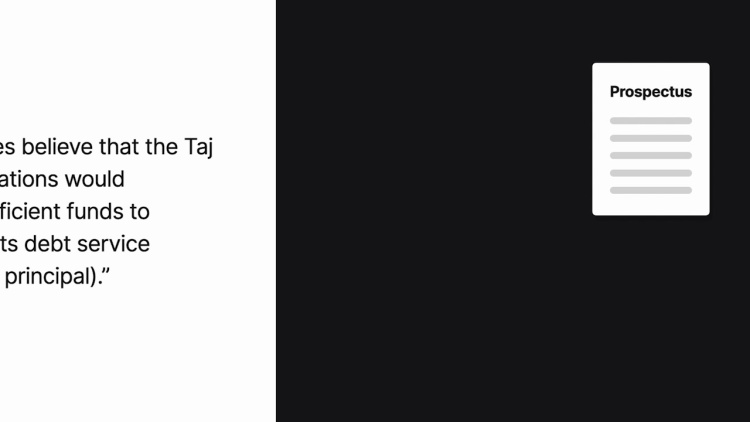In re Donald J. Trump Casino Securities Litigation (Kaufman v. Trump’s Castle Funding)
United States Court of Appeals for the Third Circuit
7 F.3d 357 (1993)
- Written by Eric Maddox, JD
Facts
Donald J. Trump and other Trump-owned entities (defendants) offered $675,000,000 in first-mortgage investment bonds to the public at an interest rate of 14 percent in November 1988, with the goal of raising capital to build and open the Taj Mahal casino in Atlantic City. The prospectus accompanying the bond issuance estimated costs at $805,000,000, with sources of income coming from the bonds, a capital contribution by Trump, and loans. The prospectus indicated that the defendants believed the funds generated from the operation of the Taj Mahal would be sufficient to cover all of the debt services. The prospectus also included cautionary statements, including the fact that the scale and size of the venture were unprecedented and that there were a variety of risks, including a high level of competition and a peak season of business only in the summer. The defendants ended up filing for bankruptcy. Sidney Kaufman (plaintiff) had purchased bonds from the defendants and subsequently sued individually and on behalf of a class of bond purchasers (plaintiffs), claiming that the text of the prospectus was materially misleading in violation of the Securities Act of 1933, 15 U.S.C. § 77a, and the Securities Exchange Act of 1934, 15 U.S.C. § 78a. The district court dismissed the complaint, and the plaintiffs appealed.
Rule of Law
Issue
Holding and Reasoning (Becker, J.)
What to do next…
Here's why 907,000 law students have relied on our case briefs:
- Written by law professors and practitioners, not other law students. 47,100 briefs, keyed to 996 casebooks. Top-notch customer support.
- The right amount of information, includes the facts, issues, rule of law, holding and reasoning, and any concurrences and dissents.
- Access in your classes, works on your mobile and tablet. Massive library of related video lessons and high quality multiple-choice questions.
- Easy to use, uniform format for every case brief. Written in plain English, not in legalese. Our briefs summarize and simplify; they don’t just repeat the court’s language.





